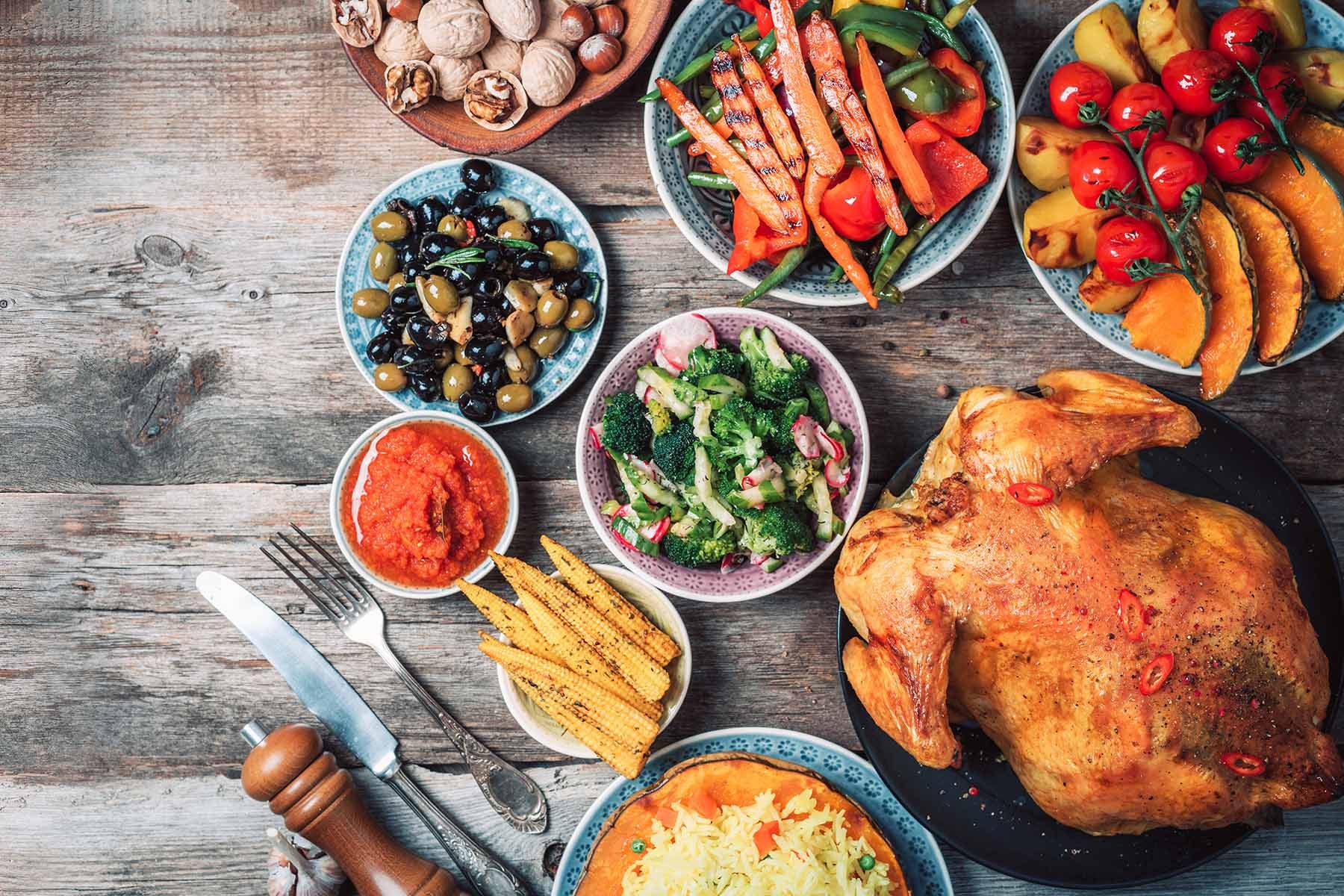As I’ve shared before, Reggie was a foodie. He loved food and loved others with food. So, you can imagine how challenging it was for him to make the dietary changes his doctor required after diagnosing him with diabetes.
In fact, the days following this revelation were the only time I really saw him angry and frustrated. His frustration stemmed from a dilemma. His dilemma was due to the tension between his love for food and his desire to make healthy changes for the loved ones in his life.
Ironically, the answer to his dilemma came through a fast—a season where Reggie limited his food in order to hear from God and receive deliverance from overindulging in food.
Part 7 of How to Respond When Life Happens
As I study about famines—a kind of spiritual activity involving food that occurred in Ruth 1:1, I’m learning they’re very different from the other spiritual activities involving food—fasts and feasts. All three activities play important roles in a Christian’s life.
Now it came to pass, in the days when the judges ruled, that there was a famine in the land. And a certain man of Bethlehem, Judah, went to dwell in the country of Moab, he and his wife and his two sons.
~ Ruth 1:2a
As such, we are taking a moment to delve into them as part of our deep dive into the Book of Ruth. Consequently, in today’s post, we’ll look at the differences between famines, fasts, and feasts in the Bible. I hope it blesses you.
Famines in the Bible
As discussed last week, the Hebrew word translated “famine” in Ruth 1:1 is ra’ab, which means “to be hungry, suffer famine, and starve.” More importantly to today’s discussion, God sent the famine in this passage to get Israel’s attention in the wake of their rampant disobedience with the goal of leading Israel to repentance (Leviticus 26:16, 19-20).
I also will do this to you: I will even appoint terror over you, wasting disease and fever which shall consume the eyes and cause sorrow of heart. And you shall sow your seed in vain, for your enemies shall eat it. … I will break the pride of your power; I will make your heavens like iron and your earth like bronze. And your strength shall be spent in vain; for your land shall not yield its produce, nor shall the trees of the land yield their fruit.
The first difference I would like to note is God sends famines. Since God sends famines, we have no choice in the matter. God decides to send them and we have no choice, but to receive them.
At some point during their walk with God, the Israelites were disobedient. They sinned. Their sin became so egregious that God sent a famine to get them to stop sinning. God’s goal was their repentance.
Famines create an emptiness. God creates this emptiness in us with the goal of us filling it with Him. God wants us to stop sinning and embrace Him instead.
If you want to embrace God, but are worried your sin is too egregious—too big—for God to take you back, don’t be. 1 John 1:9 says:
If we confess our sins, He is faithful and just to forgive us our sins and to cleanse us from all unrighteousness.
~ 1John 1:9
In other words, there is no sin too big for God to forgive. He loves us that much. He loves us enough to forgive all of our sins. So, acknowledge your sin today and repent. Turn away from your sin. He’s waiting with open arms to receive you. Don’t wait for Him to send a famine.
Fasts in the Bible
Fasting is limiting an activity—such as eating—in whole or part as a method of seeking God.
By limiting yourself in this way, fasting creates an emptiness in your life that you fill with God (i.e. prayer, Bible study, etc.). So, emptiness is a quality fasts and famines have in common. Both are spiritual activities involving food that create emptiness.
Fasting creates an emptiness in your life that you fill with God. Share on XGod commanded Israel to fast—to periodically empty themselves—to remind them of their captivity and what it was like to be without. Israel didn’t always have the abundance found in the land of milk and honey given to them by God. Fasts are their reminders not only of a period of lack, but also what it is to be someone lacking.
Therefore, one of the goals of fasting is empathy.
God wants us to be empathetic, so when we encounter those without, we will be His instrument through which He provides for them. When we encounter people without, God wants us to care—and to share.
Because it’s a command, unlike famines, we have the option. We can partake in fasts—or not. In other words, fasts are a choice. As a choice, they are temporary, but intentional. One doesn’t fast by accident. Therefore, just missing a meal doesn’t qualify as a spiritual fast.
Though we have a choice, we shouldn’t enter into fasts lightly or haphazardly, but reverently. From Deuteronomy 8:3, we see that one’s posture during a fast is humility—a posture of reverence. This is an important point because, without humility, fasting becomes an empty pretense for public attention instead of a submissive act to bring our attention back to God.
So He humbled you, allowed you to hunger, and fed you with manna which you did not know nor did your fathers know, that He might make you know that man shall not live by bread alone; but man lives by every word that proceeds from the mouth of the Lord.
~ Deuteronomy 8:3
One way to resist the temptation to fast for public consumption is to follow Jesus’ advice to fast in secret (Matthew 6:16-18):
Moreover, when you fast, do not be like the hypocrites, with a sad countenance. For they disfigure their faces that they may appear to men to be fasting. Assuredly, I say to you, they have their reward. But you, when you fast, anoint your head and wash your face, so that you do not appear to men to be fasting, but to your Father who is in the secret place; and your Father who sees in secret will reward you openly.
Sharing only with those who need to know about our fasts helps keep our minds on God and His reaction to our fasts rather than that of others in our lives. Fasting in secret also helps us fulfill the goal of fasting—drawing closer to God.
And since it is our choice, we can choose to draw closer to Him whenever we want.
Feasts in the Bible
Last, but not least of the spiritual activities involving food I’m covering today is feasts. Whereas, famines and fasts are about creating an emptiness for God to fill, feasting is about fullness—filling up to overflowing with God without emptying out first. Thus, though food is involved, feasting is more than mere indulgence. Feasting is more about God than food. It’s more about God than anything or anyone else.
Feasting is about fullness—filling up to overflowing with God without emptying out first.
In Psalm 19:1-4a and Isaiah 43:7, we learn we—all of creation, then man specifically—were created for God’s glory:
To the Chief Musician. A Psalm of David. The heavens declare the glory of God; And the firmament shows His handiwork. Day unto day utters speech, And night unto night reveals knowledge. There is no speech nor language Where their voice is not heard. Their line has gone out through all the earth, And their words to the end of the world. ~ Psalm 4:1-4a
Everyone who is called by My name, Whom I have created for My glory; I have formed him, yes, I have made him. ~ Isaiah 43:7
The New Oxford American Dictionary defines glory as “high renown (being known) or honor won by notable achievements, praise, and worship.” In other words, God created us to know Him and His works, and to make our knowledge of them—Him and His works—known to Him and others through our praise and worship.
Feasting is the time God commanded for us to focus on bringing Him glory by setting aside whole days where we come together and celebrate Him. These are days when we give God our undivided attention through worship and praise. One of the ways we worship and praise Him is through fullness. We eat our fill in celebration of the marvelous abundance our Father—God Almighty—sees fit to share with us.
God created us to know Him and His works, and to make our knowledge of them—Him and His works—known to Him and others through our praise and worship.
Because He commands feasting, it’s part of our assignments. Part of our jobs as part of His creation is to magnify Him and one of the ways He commands we do it is through feasting. And as with all commands, we have the choice to feast—or not.
To be honest, that boggles my mind. Who would not want to indulge? I’m tempted to indulge every day. Truth be told, I’m tempted at far too many meals. But here lies the real choice. The choice isn’t simply to indulge. God isn’t commanding us simply to feast or celebrate. God’s command is to feast and celebrate Him. The choice is who or what we choose to give our focus and attention when feasting.
Will we focus on Him or the food? Will we focus on the gift or the giver—or worse, neither? We could focus on ourselves or someone else. Yet that’s far from God’s intention with His command that we feast. No, God’s goal is always His glory.
God’s command is to feast and celebrate Him. Share on XWe celebrate and magnify Him to draw us closer to Him. Drawing closer to Him is the common thread through each of these three spiritual activities. God’s goal with famines, fasts, and feasts is to draw us closer to Him, and in doing so, He receives the glory.
So, as you create your new life, “whatever you do, do it heartily, as to the Lord and not to men” (Colossians 3:23-24)—whether famine, fast or feast.
Until next time…
Agape—loving and loved by Jesus,
Dawn
The “How to Respond When Life Happens” Series:
- Part 1 – How to Respond When Life Happens
- Part 2 – The Freedom to Do You
- Part 3 – The Purpose of Chaos
- Part 4 – The Difference Between Felt Needs and Real Needs
- Part 5 – Who’s Ruling You? An Article about Submission
- Part 6 – Famines in the Bible
- Part 7 – The Differences Between Famines, Fasts and Feasts
- Part 8 – Famine in the Community
- Part 9 – The Meaning of the Land as Israel’s Possession
- Part 10 – What’s Important about Naomi’s Opening Situation in the Book of Ruth?
- Part 11 – Three Locations in the Book of Ruth
- Part 12 – Traveling in the Book of Ruth vs. Now
- Part 13 – Naomi’s Family’s Names in the Book of Ruth







